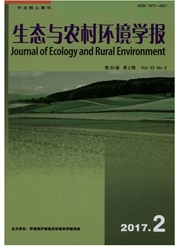

 中文摘要:
中文摘要:
土壤水分是荒漠草原区土地可持续利用的重要指标,通过多个连续生长季的观测能够分析土壤水分的可持续性。对2011—2012年连续2 a土壤水分和降水量进行定点观测,比较分析了荒漠草原区不同土地利用类型土壤水分的时空变化。结果表明:枯水年不同土地利用类型之间土壤水分差异比丰水年大;枯水年5种土地利用类型土壤水分随时间的变化均呈增长型,而在丰水年均呈波动型;5种土地利用类型土壤水分在枯水年呈现3峰3谷的变化特征,在丰水年与降水量的波动显著相关,并且有较长时期处于稳定期(7月至次年4月);无论是丰水年还是枯水年,荒漠草原区土壤含水量以人工苜蓿地和人工甘草地较大,甘草苜蓿混合草地和天然草地次之,柠条林地最低。通过对比分析不同年份5种土地利用类型土壤水分的时空变化,以及水分补给与消耗在土壤剖面上的变化特点,可以更好地理解在景观尺度上的生态过程,对荒漠草原区土壤水分的有效利用及水土保持具有重要意义。
 英文摘要:
英文摘要:
Soil moisture is an important index for sustainable utilization of desert steppe. Based on multi-point field observations of soil moisture and precipitation through two consecutive years of growing seasons, sustainability of soil moisture and spatio-temporal variation of soil moisture in soils different in land-use in the studied desert steppe was analyzed. Results show that soils different in land-use differed more sharply in soil moisture, in a dry year than in a wet year; soil moisture increased with the time in all the soils regardless of land use types in the dry years, but undulated in the wet year; the variation of soil moisture displayed a curve of three peaks and three valleys in the dry year in all the soils, but in wet year it was closely related to precipitation, and soil moisture remained stable for quite a long time, from July to the next April; No matter whether in wet or in dry year, soil moisture was relatively high in alfalfa field and licorice field, lower in licorice-alfalfa mixed grassland and natural grassland, and the lowest in Caragana shrubland. The comparative analysis of the five soils different in land use, and spatio-temporal variations of their soil moisture and water supply and consumption may help better understand ecological process of the steppe on the landscape scale, which will be of some important significance to the effective use of soil moisture and soil and water conservation in desert steppe regions.
 同期刊论文项目
同期刊论文项目
 同项目期刊论文
同项目期刊论文
 期刊信息
期刊信息
